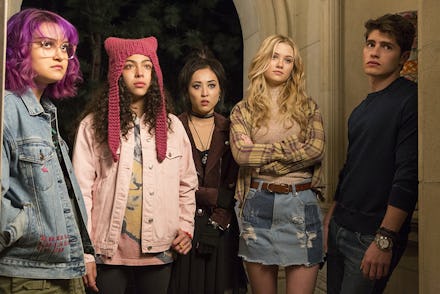We need to talk about the rape scene in ‘Marvel’s Runaways’

In this, the year of our lord 2017, a TV show — in this case, Marvel’s Runaways — still thinks it’s a good idea to use rape as a plot device. Did we learn nothing from the endless discussion around Game of Thrones? Aren’t you tired? I’m tired.
First, let’s back up and establish what Marvel’s Runaways is all about, in case this is the first you’re hearing about it: It’s an adaptation of a popular Marvel comic that was launched in 2003, called Runaways. Unlike other big-budget, explosion-filled blockbusters you might be used to when you think of Marvel, Runaways is more like Marvel’s take on The O.C. or Riverdale — with a dash of X-Men thrown in for good measure. In fact, Josh Schwartz and Stephanie Savage, both of whom worked on The O.C. and Gossip Girl, are responsible for bringing Runaways to Hulu — and it shows.
In lieu of recognizable Avengers, Runaways stars a ragtag bunch of superpowered teens who discover that their parents are part of a mysterious crime organization called the Pride that also might or might not be a magical cult. One of them also has a dinosaur in their basement. Don’t ask.
Overall, the premiere kicks the series off confidently. The banter between the main cast of teens is sharp and believable, and the show does a great job of keying in on that paranoia that many kids feel at some point — that their parents might not always be telling the whole truth about who they are.
Naturally, some things have been changed in Runaways’ translation from comic to television, including several scenes that weren’t part of the original comic at all. And here’s where things get messy: In the first episode of Marvel’s Runaways, a scene written specifically for the television show uses the attempted rape of a main character as a plot device.
It happens about two-thirds of the way into the premiere, when Karolina (Virginia Gardner), the preachy, doe-eyed spokesperson for the Church of Gibborim — the show’s fictional, Scientology-esque religion, whose members all sport shackle-like metal bracelets — decides to be rebellious and go to a trashy teen house party. After spotting two women kissing and dancing together, Karolina removes her bracelet, an act that causes her supernatural powers to begin manifesting. Her skin emits a colorful, glittery glow and, shortly thereafter, she faints. Two men at the party see Karolina’s unconscious body on the dance floor and haul her upstairs without even exchanging a glance between them. Chase (Gregg Sulkin) — the show’s brawny, handsome jock who is also at the party — sees what’s happening and darts after them.
When Chase bursts through an upstairs bedroom door, he sees the two men hunched over Karolina’s body, undoing her belt. A few punches later, the two creeps sulk back to the dance floor, presumably to prey on someone else.
If Chase ever tells Karolina what happened, we don’t see it onscreen. We see her wake up, and, in the next scene, they’re talking about how she felt before she passed out. In other words, this attempted rape exists solely to make the audience care more about Chase, and in no way really matters to Karolina’s story.
All this scene really does for Karolina is punish her for a fleeting moment of same-sex attraction, sending the message that expressing one’s own sexuality will inevitably result in sexual violence. The one time Karolina escapes her puritanical guardians, two men attempt to rape her.
It’s possible that all this may have a payoff later on, but the way it’s presented thus far, it’s not handled particularly well.
And wow, isn’t Chase — who, up until this point, seemed like a jerk — just so dreamy and kind? You can tell he’s a good guy because he didn’t join in when his friend was about to get raped. #BoyfriendGoals and all that. Also, in a roundabout way, Chase swooping in to Karolina’s rescue justifies a pretty rude thing he did earlier in the episode: ditching a tutoring session with another character, Gert (Ariela Barer), to go to the party instead.
Given the firestorm that’s previously erupted around Game of Thrones and its repeated exploitation of rape as plot device, it’s baffling that Runaways falls prey to such an easily avoidable pitfall.
Of course, sexual assault is a very real problem that our fictions shouldn’t shy away from tackling entirely, but Marvel’s Runaways’ take feels decidedly old fashioned. That’s especially true in contrast to the rest of the show, which offers a notably empathetic and respectful — if a bit broad — look at life as a teenager. In fact, the show itself is getting tentatively positive buzz from other outlets, like the A.V. Club and Vulture, so it’s a bummer that an otherwise compelling series is marred by such a nasty blemish.
It remains to be seen whether future episodes will justify this bizarre scene, but I’m not holding my breath.